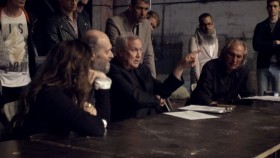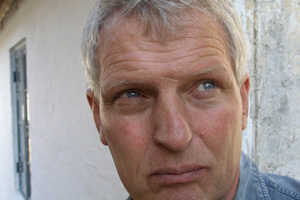


DocuDays Kiev: Docu/Class
”The School of Disillusionment”… is the subtitle of this year’s Docu/Class in Kiev at the festival that starts in four days and runs until April 1st. Look at the creative logo for this part of the event, (how do you interpret that?) and read this inviting introduction quote from the internet:
”The real learning – the one that never ends – is a process of constant disillusionment. Or, in other words, of going through the illusions. It is only on the ruines of someone else’s ideals and desires that you painfully sloughed off like an old skin, the most valuable knowledge about your true self arises. This year’s documentary master class program DOCU/CLASS offers series of lectures that can potentially lead you through the disillusionment circle – from the sobering to new, more mature inspiration – believes Julia Serdyukova, DOCU/CLASS and photo exhibition coordinator.
We expect a lecture by Danish film director Jon Bang Carlsen “Reality Is a Question of Faith” to be the most explosive one. Do
you still believe in the concept of “objective”, “fly on the wall”-style documentary? If you do, this lecture is for you. Are you convinced that the “reality” doesn’t exist, and this is an excuse for all kinds of manipulations with the heroes and image? Then, this lecture is definitely for you. The inventor and consistent adherent of radical ‘staged documentary’, Jon Bang Carlsen will speak about his unique approach to seeking reality by actively creating it at the point where genres intersect. His “not exactly a documentary” “It’s Now or Never” screening will take place the day before the lecture as a part of “High five from Denmark” program…”.
Yes, Jon Bang Carlsen’s film is one of five high quality films, that I have had the pleasure to select for the festival – ”66 Scenes from America” and ”Motion Picture” (by Jørgen Leth and Ole John), ”Family” by Sami Saif and Phie Ambo and ”The Monastery” by Pernille Grønkjær the other four. I am looking forward to come back to Kiev, also to do a talk on Danish documentary culture -2011 was last time, a complicated stay as the capital of Ukraine had meter-high snow.
The Docu/Class programme – a whole workshop in itself – also includes international names like Latvian Viesturs Kairiss to talk about music, critic and programmer Pamela Cohn on ”the guillotine of New American cinema”, presentation of a book and a discussion following a photo exhibition by Misha Fridman: ”The Role of Women in the new Ukrainian police force”.

